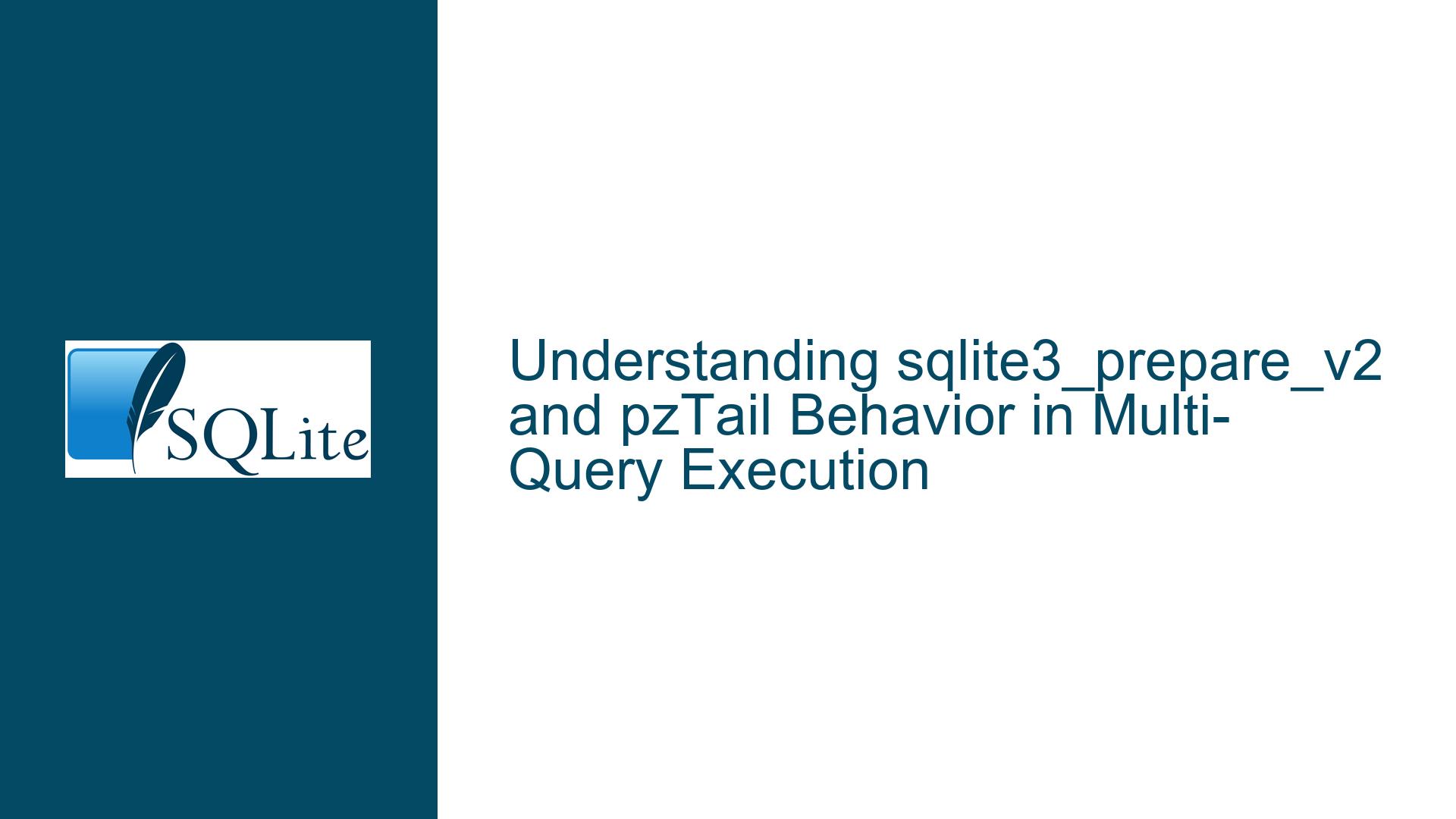sqlite3_prepare_v2 and pzTail Behavior in Multi-Query Execution
sqlite3_prepare_v2 Fails to Process Multi-Query Statements Correctly
The core issue revolves around the behavior of the sqlite3_prepare_v2 function in SQLite, specifically how it handles multi-query SQL statements and the role of the pzTail parameter. The expectation was that pzTail would point to the next SQL statement in a multi-query string after the first statement is processed. However, this expectation is not met when sqlite3_prepare_v2 encounters an error or when sqlite3_step returns a non-zero value. This discrepancy raises questions about whether this behavior is by design or a bug, and how developers should handle such scenarios in their applications.
Interrupted Parsing Due to SQL Syntax Errors or Runtime Failures
The primary cause of the confusion stems from the misunderstanding of how sqlite3_prepare_v2 and pzTail interact during the parsing and execution of SQL statements. When sqlite3_prepare_v2 is called, it begins parsing the SQL statement from the beginning of the string provided in the zSql parameter. If the parser encounters an error, such as a syntax error or an unsupported SQL construct, it stops parsing and sets pzTail to point to the location immediately following the last successfully parsed character. This means that pzTail does not necessarily point to the next SQL statement in a multi-query string but rather to the point where parsing stopped due to an error.
Furthermore, the behavior of pzTail is contingent on the return value of sqlite3_prepare_v2. If sqlite3_prepare_v2 returns SQLITE_OK, pzTail will point to the next SQL statement in the multi-query string. However, if sqlite3_prepare_v2 returns an error, pzTail will point to the location where parsing stopped, which may not be the beginning of the next SQL statement. This behavior is by design and is documented in the SQLite API reference, but it can be counterintuitive for developers who expect pzTail to always point to the next statement regardless of the outcome of sqlite3_prepare_v2.
Another contributing factor is the misunderstanding of the return values of sqlite3_step. The function sqlite3_step never returns SQLITE_OK; instead, it returns SQLITE_ROW, SQLITE_DONE, or an error code. If sqlite3_step returns an error, it indicates that the execution of the prepared statement failed, and the application should handle the error appropriately. However, the presence of an error does not affect the value of pzTail, which remains pointing to the location where parsing stopped during the call to sqlite3_prepare_v2.
Implementing Robust Error Handling and Multi-Query Execution Strategies
To address the issues arising from the behavior of sqlite3_prepare_v2 and pzTail, developers need to implement robust error handling and multi-query execution strategies. The following steps outline a comprehensive approach to troubleshooting and resolving these issues:
Check the Return Value of
sqlite3_prepare_v2: Before proceeding with the execution of a prepared statement, always check the return value ofsqlite3_prepare_v2. If the return value is notSQLITE_OK, handle the error appropriately and do not attempt to callsqlite3_step. The value ofpzTailin this case will point to the location where parsing stopped, which may not be the beginning of the next SQL statement.Handle Errors from
sqlite3_step: When callingsqlite3_step, be prepared to handle errors that may occur during the execution of the prepared statement. Ifsqlite3_stepreturns an error, such asSQLITE_ERRORorSQLITE_BUSY, take appropriate action based on the nature of the error. For example, if the error isSQLITE_BUSY, you may need to retry the operation after a short delay.Use
pzTailCorrectly: When processing multi-query SQL strings, usepzTailto determine the next statement to execute only ifsqlite3_prepare_v2returnsSQLITE_OK. Ifsqlite3_prepare_v2returns an error, do not rely onpzTailto point to the next statement. Instead, handle the error and consider re-parsing the remaining SQL string from the beginning or using a different approach to execute the remaining statements.Implement a Multi-Query Execution Loop: To execute multiple SQL statements in a single string, implement a loop that processes each statement sequentially. Use
pzTailto advance to the next statement only if the previous statement was successfully prepared and executed. If an error occurs, break out of the loop and handle the error appropriately.Consider Using Transactions: When executing multiple SQL statements, consider wrapping them in a transaction to ensure atomicity. If an error occurs during the execution of one of the statements, you can roll back the transaction to undo any changes made by the previous statements. This approach helps maintain data consistency and simplifies error handling.
Test with Different SQL Statements: To ensure that your application handles all possible scenarios correctly, test it with a variety of SQL statements, including those that may cause errors during parsing or execution. This testing will help you identify any edge cases and ensure that your error handling logic is robust.
Review the SQLite Documentation: Familiarize yourself with the SQLite API documentation, particularly the sections on
sqlite3_prepare_v2,sqlite3_step, andpzTail. Understanding the documented behavior of these functions will help you avoid common pitfalls and implement correct and efficient multi-query execution logic.
By following these steps, developers can effectively troubleshoot and resolve issues related to the behavior of sqlite3_prepare_v2 and pzTail in multi-query execution scenarios. Implementing robust error handling and multi-query execution strategies will ensure that your application can handle all possible outcomes of SQL statement parsing and execution, leading to more reliable and maintainable code.
Detailed Explanation of sqlite3_prepare_v2 and pzTail Behavior
To further clarify the behavior of sqlite3_prepare_v2 and pzTail, let’s delve into the internal workings of these functions and how they interact with the SQLite parser and executor.
The Role of sqlite3_prepare_v2
The sqlite3_prepare_v2 function is responsible for compiling an SQL statement into a prepared statement object, which can then be executed using sqlite3_step. The function takes an SQL string (zSql) and parses it to create a bytecode program that the SQLite Virtual Database Engine (VDBE) can execute. The nByte parameter specifies the maximum length of the SQL string, and ppStmt is an output parameter that points to the prepared statement object.
The pzTail parameter is an output parameter that points to the first byte after the end of the SQL statement that was successfully parsed. If sqlite3_prepare_v2 returns SQLITE_OK, pzTail will point to the beginning of the next SQL statement in a multi-query string. However, if sqlite3_prepare_v2 returns an error, pzTail will point to the location where parsing stopped, which may not be the beginning of the next SQL statement.
The Role of pzTail
The pzTail parameter is used to facilitate the execution of multiple SQL statements in a single string. When sqlite3_prepare_v2 is called, it parses the SQL string up to the first semicolon (or the end of the string, if no semicolon is present). If the parsing is successful, pzTail will point to the beginning of the next SQL statement in the string. This allows the application to call sqlite3_prepare_v2 again with the new value of pzTail to prepare and execute the next statement.
However, if sqlite3_prepare_v2 encounters an error during parsing, pzTail will point to the location where parsing stopped. This means that pzTail may not point to the beginning of the next SQL statement, and the application cannot rely on it to continue processing the remaining SQL string. Instead, the application must handle the error and decide how to proceed, which may involve re-parsing the remaining SQL string or aborting the multi-query execution.
The Role of sqlite3_step
Once a statement has been successfully prepared using sqlite3_prepare_v2, it can be executed using sqlite3_step. The sqlite3_step function advances the prepared statement to the next result row or to the end of the result set. The function returns SQLITE_ROW if a new row of data is available, SQLITE_DONE if the statement has completed execution, or an error code if an error occurred.
It is important to note that sqlite3_step never returns SQLITE_OK. If sqlite3_step returns an error, it indicates that the execution of the prepared statement failed, and the application should handle the error appropriately. However, the presence of an error does not affect the value of pzTail, which remains pointing to the location where parsing stopped during the call to sqlite3_prepare_v2.
Practical Example
Consider the following multi-query SQL string:
CREATE TABLE t1 (a INT, b TEXT); INSERT INTO t1 VALUES (1, 'foo'); SELECT * FROM t1;
When this string is passed to sqlite3_prepare_v2, the function will parse the first statement (CREATE TABLE t1 (a INT, b TEXT);) and set pzTail to point to the beginning of the next statement (INSERT INTO t1 VALUES (1, 'foo');). If sqlite3_prepare_v2 returns SQLITE_OK, the application can then call sqlite3_step to execute the CREATE TABLE statement.
After executing the CREATE TABLE statement, the application can call sqlite3_prepare_v2 again with the new value of pzTail to prepare and execute the INSERT statement. This process can be repeated for the SELECT statement.
However, if sqlite3_prepare_v2 encounters an error while parsing the CREATE TABLE statement, pzTail will point to the location where parsing stopped, which may not be the beginning of the INSERT statement. In this case, the application must handle the error and decide how to proceed, which may involve re-parsing the remaining SQL string or aborting the multi-query execution.
Conclusion
The behavior of sqlite3_prepare_v2 and pzTail in multi-query execution scenarios is by design and is documented in the SQLite API reference. However, it can be counterintuitive for developers who expect pzTail to always point to the next SQL statement regardless of the outcome of sqlite3_prepare_v2. By understanding the internal workings of these functions and implementing robust error handling and multi-query execution strategies, developers can effectively troubleshoot and resolve issues related to the behavior of sqlite3_prepare_v2 and pzTail. This approach ensures that applications can handle all possible outcomes of SQL statement parsing and execution, leading to more reliable and maintainable code.






